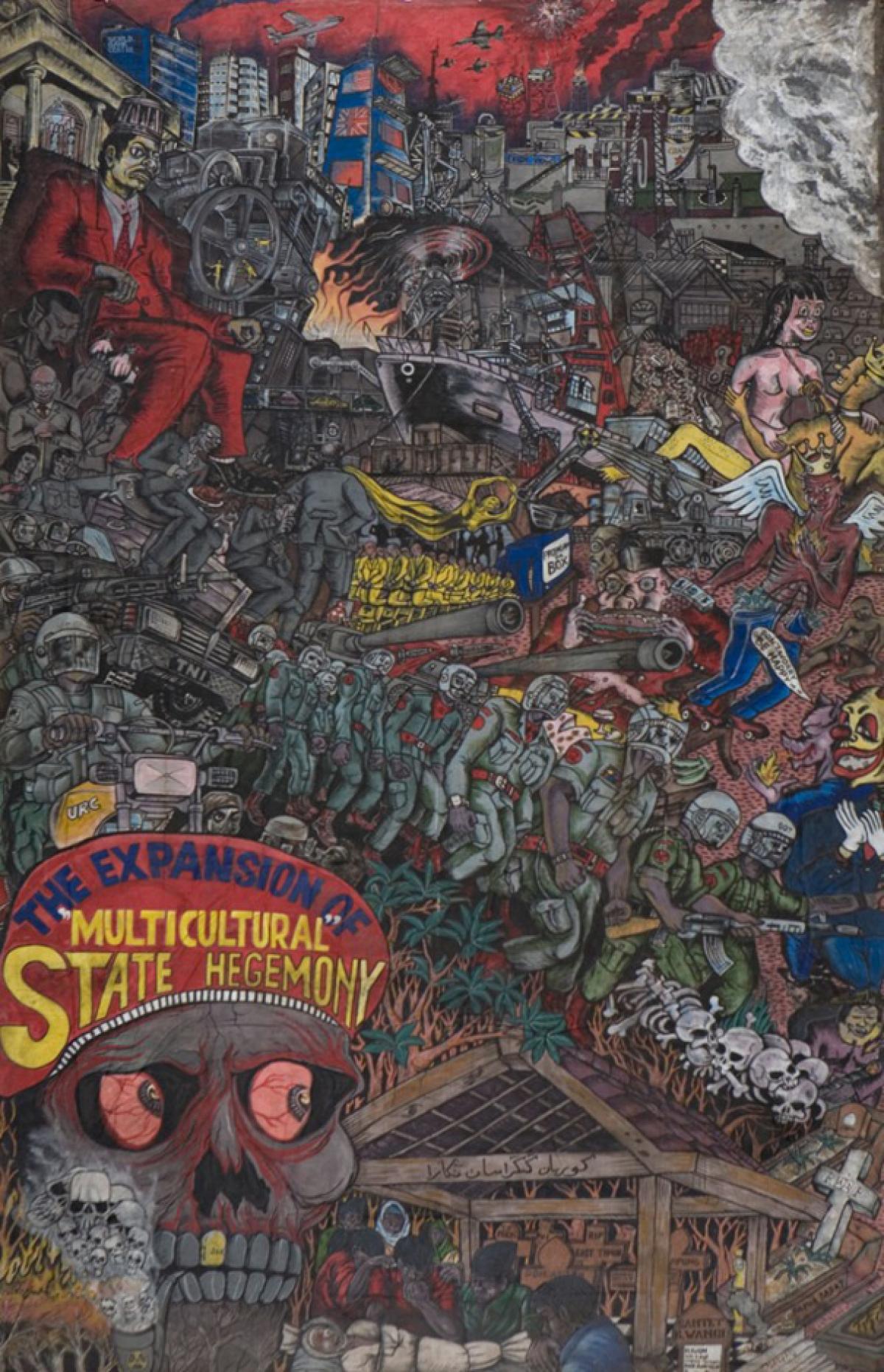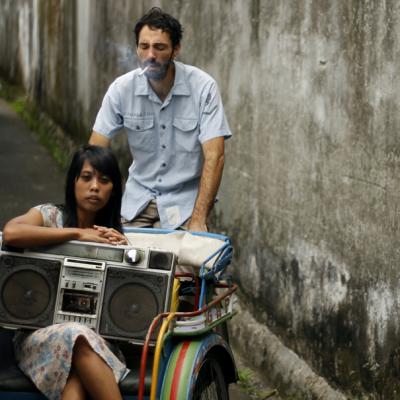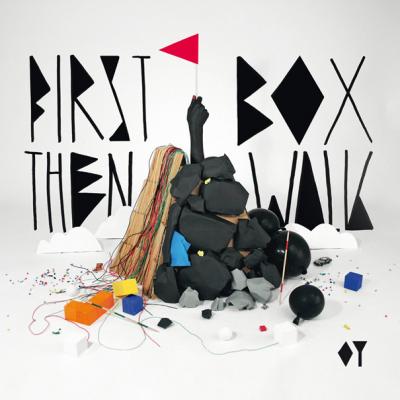Barcelona based producer and percussionist Grey Filastine receives enthusiastic reviews by the New York Times and the International Blogospheres. His music is «less like ‹world› music and more like music from another world.» Norient asked him about complex travel logistics, editing-strategies in his collaboration with musicians from Indonesia, and about his view of the world as a whole. An e-mail interview. From the Norient book Out of the Absurdity of Life (see and order here).
[Thomas Burkhalter]: Grey Filastine, you have a new album out. What is your main emotion about it right now?
[Grey Filastine]: Relief, it's like having a baby, but instead of 9 months gestation period it is two years.
[TB]: You are collaborating with artists worldwide for many years. I remember the great recording with Algerian rapper Ourrad Rabah for example, and many other tracks. How do you finance your projects and make a living?
[GF]: I survive now from performing. The only problem is when I stop touring in order to work on videos or new music, there is a sudden end to the cash flow. In those lean moments I find some odd way to make money, buying and selling things on Ebay. I still own Yellow Taxi in America, it's in operation 24hours per day, but leased into a friendly cartel of Somalis. I make a little money on that too.
[TB]: How do you live?
[GF]: I live on diet of stress, panic and complex travel logistics. But I live well.
Video not available anymore.
[TB]: How do you find the artists you collaborate with?
[GF]: I always get introduced by mutual friends, sometimes via bizarre serendipity. I've never done a mail-order for hiring a famous vocalist. For instance, Amélie Bouard, the cellist. I met her once while she carried her instrument on the street in Lyon. One year later I was due to perform in Reunion Island, leaving from Lyon, and had a VJ with me. He cancelled the day before the flight, and we could only change the name on the ticket... we called this cellist and offered her a trip to Reunion the next day and play cello with me. She learned the parts on the 12 hour flight and has toured with me ever since.
[TB]: How do you see the music scene in Indonesia. What were the groups, musicians, networks that interested you? Can you recommend Norient some local names, links, tracks and/or videos?
[GF]: Yes, here some of my favourites:
Yes No Wave Music (net label and series of parties in Jogyakarta)
Homicide (political hiphop crew from Bandung)
Taring Padi (art interventionists and remixers of traditional culture, Jogykarta)
Wukir (experimental musician, makes own bamboo instruments, from Malang)
Jalan Surabaya (jakarta-sydney hiphop group)
[TB]: What was the musical or acoustical material that interested you?
[GF]: I love pentatonic scales, something common to that old Ethiopian jazz, gamelan, and many other musics. You can hear a lot of these melodic scales in £00T. There is nothing new to Indonesian music that made a sudden impact for this album, I've been listening to gamelan since I was a teenager, just never had a chance to spend enough time there to feel like I could work with those instruments before. Working with Nova and making the videoclips in Java provided that opportunity.
[TB]: How does the exchange between you and these musicians work? Are you in charge of the final edit, mix and master, or do you experiment with new forms of collaborations? What do you think is the right way to go?
[GF]: With rare exceptions I handle all the compositions, arrangements, editing and mixing. If another person does all that work than that music should be released under their name, not mine. There doesn't seem to be a «right» method yet, we are all still improvising with these new forms of technology and collaboration. My personal threshold for right is set very high. Most global-electronica stinks of exotification, superficiality, or is just simplified to some kind of least-common-denominator music gruel in order to have a broader appeal. But, and this is a big but, I try to keep my mouth shut and let listeners come to their own conclusions about other artists work. Many of the artists I could criticize are enjoying more success than me, so it's clear that I'm the one who is too picky.
[TB]: Music is only a small part of Filastine....
[GF]: For Filastine I also lead the graphic design, produce video clips, compile and perform live video, and am generally self-managed, which means I might prioritize a gig in Siberia or Cairo more than London, against all business-sense. Outside of Filastine, I'm developing a few other projects, the newest is the Sound Swarm, a type of megaphone surround-sound orchestra that uses a city as a reverb chamber for mobile sound interventions, usually mounted on bicycles.
[TB]: How do you see the dominant political world?
[GF]: Power and commerce are consolidating themselves across borders. Nations, which were never a lovely concept to begin with, are now superseded by something worse: corporations. With climate change we face the biggest crises in the history of humanity, but we haven't found the will to confront it. Although the situation is fucked, it's definitely an exciting time to be alive!
[TB]: What is £00T about?
[GF]: It has a few meanings, first is the noun loot: stolen objects, another word for booty. The verb loot, in a command form: go looting. The odd spelling makes it into the new currency £00T, Which will be highly valuable in the future, buy some now, because after all the national currencies collapse where do you want to have your savings?
[TB]: Working with musicians from Asia, Africa and Latin America is done by more and more producers and DJs in Europe and the US? Where do you see interesting developments today, where problems?
[GF]: We live in the most accelerated and thrilling time of musical cross pollination, and electronic music mutates, splits, and reforms so rapidly in response to new inputs. I think if rock music was discovered now, with an Elvis just stealing his first licks from «black music», the entire rise and fall of rock would last only a decade, instead of a century. It would enter into the cultural blender and get spit out as quickly as any other modern music. But since rock has pre-internet ossified form, like chamber music or Celtic music, now a continuing folkloric art form... albeit with a new haircut every few years. The new tech tools and rapid transits have smashed all the cultures together in polyglot cities which act as crucibles for new pidgen hybridizations of language, culture, music. There is no going back.
[TB]: Terms and scenes like Global Ghettotech, Tropical Bass were coined. How do you see these terms and scenes? Do you feel somewhere close to them?
[GF]: These kind of terms are always weird and inaccurate, but we have to use some words right? I feel like a cousin to artists in this nascent genres. I'm glad they are there, because without them I wouldn't have any family at all. Original is just another word for lonely.
[TB]: Your label Post World Industries was founded in the late 90's by the noise/performance collective ¡tchkung!, and later maintained by Richard Wilson and Grey Filastine. Wilson was nabbed by the FBI & is now in Federal prison. What happened?
[GF]: He was running a speakeasy bar and casino, the local police made a partnership with the FBI to organize an investigation that involved years of undercover agents and wiretapping. The idea was to get him in a vise, forcing him to snitch information on a series of eco-sabotage cases. He either doesn't have that information or won't share it, so he has a seven year vacation to «Club Fed» – «Federal Prison».
[TB]: What happened next, musically. Will you tour with the musicians from your new album?
[GF]: I've been touring the new album already in North America, followed by a performance in Cairo just near Tahrir Square. Now starting a three month EU tour. Here in Europe I'm joined for all gigs by Nova, the Javanese rapper/singer. We will also have Amelie, the cellist from Lyon, along for gigs when the promoters offer enough loot.







